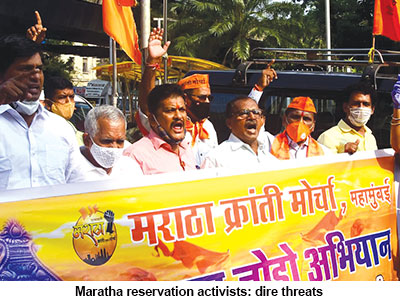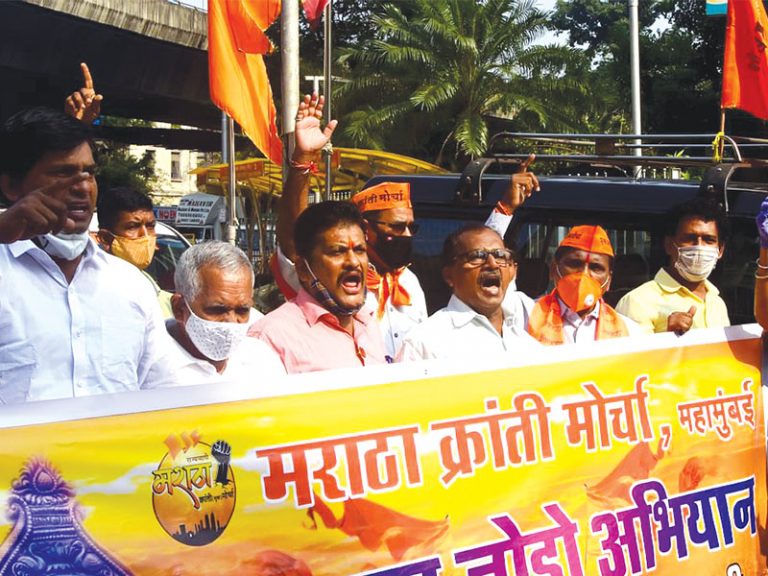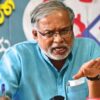Maharashtra Reservations quagmire
– Dipta Joshi (Mumbai)
 The state government has been forced to resume online admissions for 210,482 first-year junior college (FYJC) students after the Bombay high court (November 24) reprimanded it for the inordinate delay in concluding online admissions for the academic year 2020-21. Earlier, following a Supreme Court stay order (September 9) of a Maharashtra high court judgement allowing reservation of a 12 percent quota in government higher education institutions for the state’s Maratha community, the Maha Vikas Aghadi (MVA — Shiv Sena-NCP-Congress) coalition government had suspended online admissions on September 10. With only 110,348 of the total 320,830 student applicants having secured admission in the first merit list released in August, 66 percent (210,482) of school-leaving students opting to join 1,603 state board affiliated junior colleges have missed a whole semester of FYJC education.
The state government has been forced to resume online admissions for 210,482 first-year junior college (FYJC) students after the Bombay high court (November 24) reprimanded it for the inordinate delay in concluding online admissions for the academic year 2020-21. Earlier, following a Supreme Court stay order (September 9) of a Maharashtra high court judgement allowing reservation of a 12 percent quota in government higher education institutions for the state’s Maratha community, the Maha Vikas Aghadi (MVA — Shiv Sena-NCP-Congress) coalition government had suspended online admissions on September 10. With only 110,348 of the total 320,830 student applicants having secured admission in the first merit list released in August, 66 percent (210,482) of school-leaving students opting to join 1,603 state board affiliated junior colleges have missed a whole semester of FYJC education.
The resumption of admissions means that the quota reserved for the Maratha community under the Socially and Educationally Backward Classes (SEBC) Act, 2018, is stayed until a Supreme Court appointed 11-judge bench confirms its constitutional validity.
To mollify and appease the powerful Maratha community (which constitutes 33 percent of Maharashtra’s 115 million population), the MVA coalition government postponed all online admissions until this additional quota was validated by the Supreme Court. However, with the academic calendar of FYJCs, which begin classes in August-September, being delayed by a whole semester, a Bombay high court division bench passed strictures against the state government, forcing the decision to proceed with the pending online admissions.
Maharashtra follows a complicated FYJC admissions process with six of its cities including Mumbai, Pune, Nagpur, Amravati, Nashik and Aurangabad admitting students through a centralised online admission process, while the rest of the state conducts offline admissions. Thus, while most colleges conducting offline admissions completed the process before the Supreme Court stay order, students in Maharashtra’s more developed cities had to bear the brunt of political populism.
The contentious SEBC Act, 2018, legislated by the previous BJP government (October 2014- November 2019) and enforced by the MVA following dire threats of a state-wide agitation by the influential Maratha community, has been consistently opposed by education NGOs and general quota students who filed a flood of writ petitions in high and Supreme courts. According to them, reserved quotas in the state’s higher education institutions (HEIs) — for scheduled castes, scheduled tribes, other backward castes and several nomadic tribes, a special 10 percent quota for economically weaker sections of society (2019) and the 16 percent SEBC quota (reduced to 12 percent by the Bombay high court) — add up to 75 percent seats being reserved for special categories to the exclusion of merit students with better class X board exam scores. Anti-quota protesters have highlighted that the additional quotas decreed by populist state governments to appease caste vote banks is a gross violation of the 50 percent ceiling imposed by the Supreme Court in Indira Sawhney’s Case (1993).
In 1950, when the Constitution of India was promulgated, the 22.5 reserved quota for the historically oppressed and vilified scheduled castes and tribes was universally acclaimed as overdue social engineering. Since then with OBCs (other backward classes/castes) and now even the relatively advanced and powerful Maratha community demanding reserved quotas in higher education, affirmative action has become a quagmire. With the majority of students in HEIs admitted for considerations other than academic merit, it’s hardly surprising that not even one of India’s 1,008 universities — some of them of over 150 years vintage — is ranked among the Top 200 in the annual WUR (World University Rankings) league tables of QS and Times Higher Education, the globally respected London-based HEIs ranking agencies. NB. The People’s Republic of China has five.
Also read: Karnataka: Educators exasperation

















Add comment